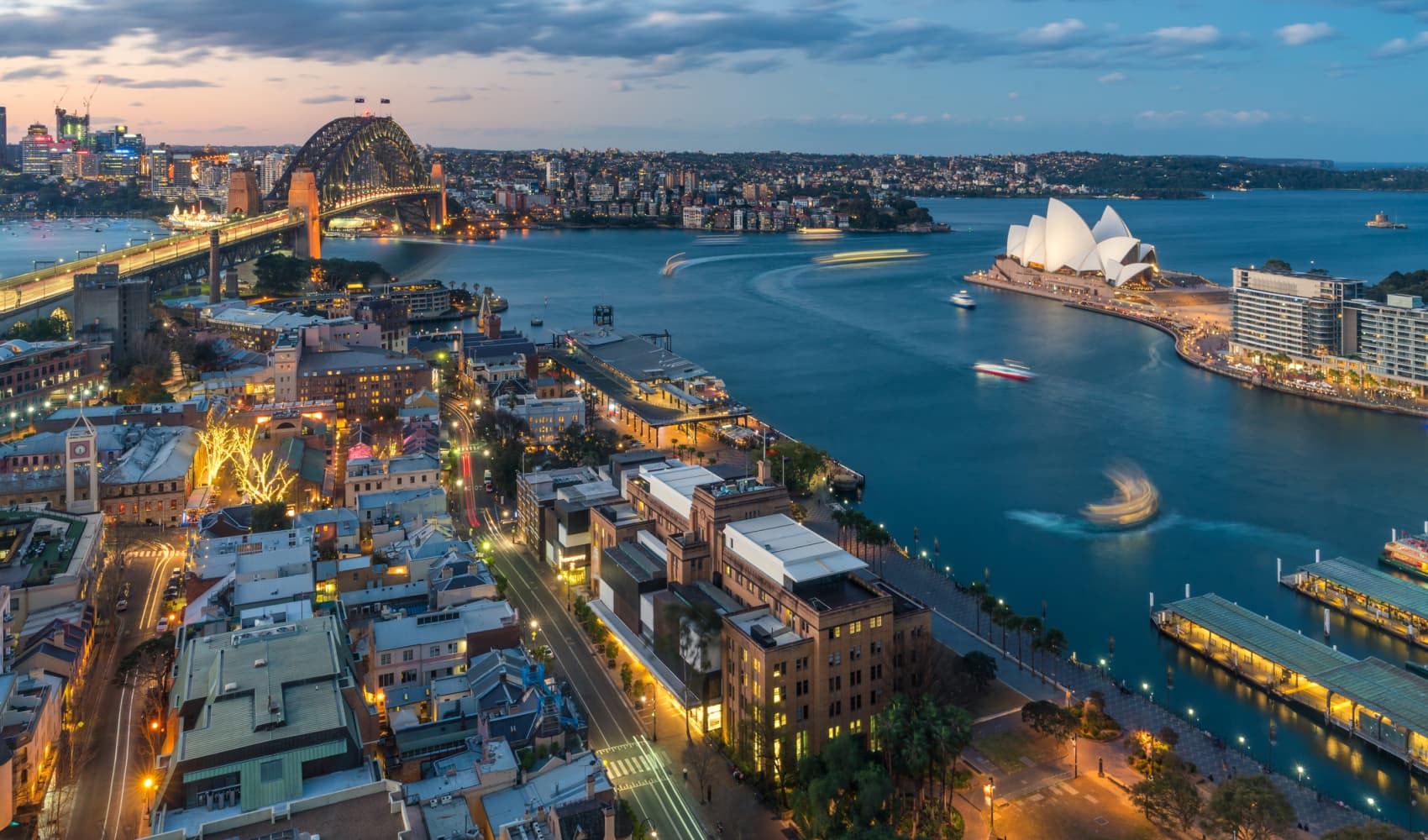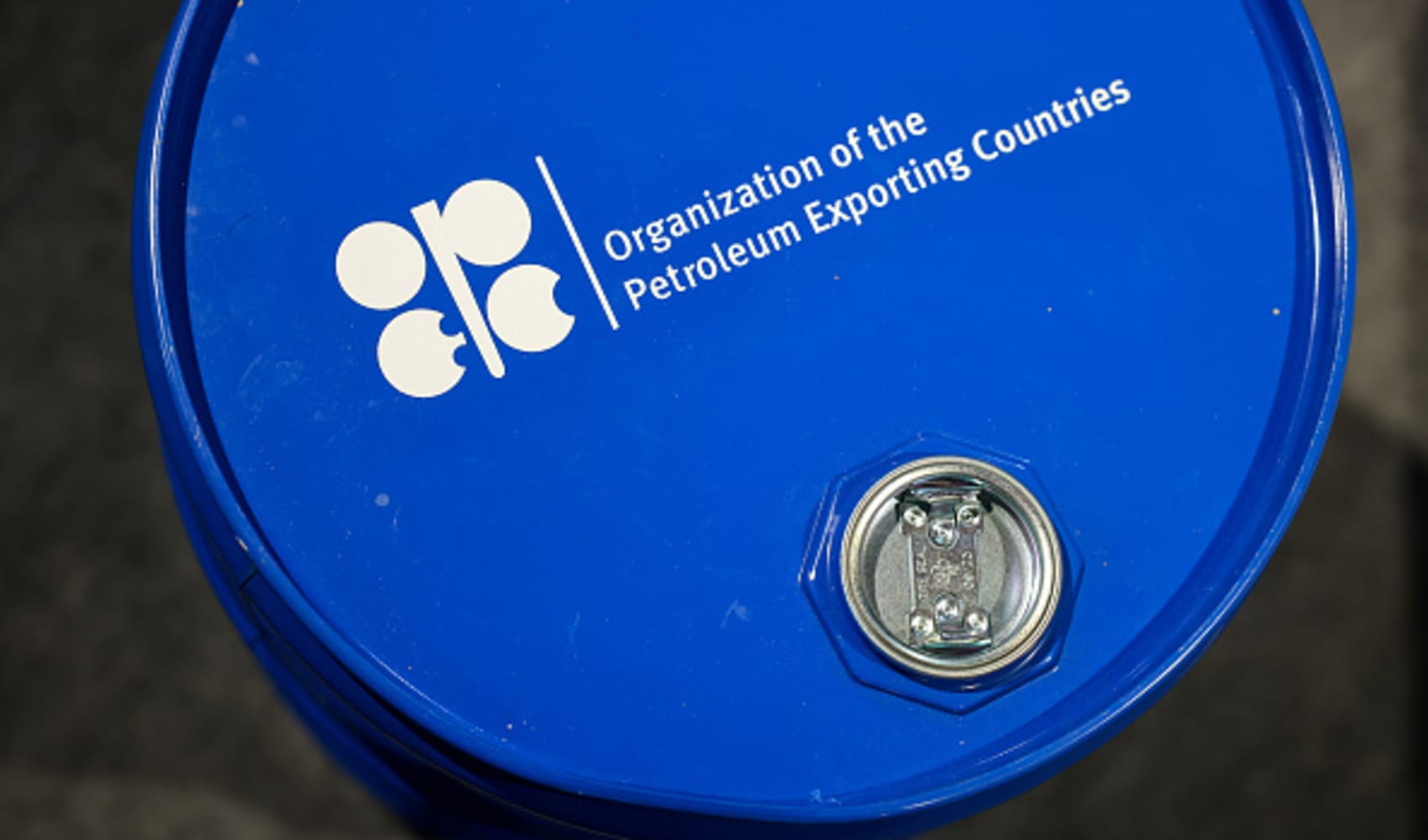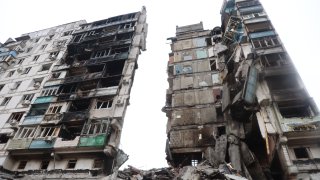
A view of partially destroyed building in the Ukrainian city of Mariupol under the control of Russian military and pro-Russian separatists on April 13, 2022.
This has been CNBC's live blog covering updates on the war in Ukraine. [Follow the latest updates here.]
Stream NBC 5 for free, 24/7, wherever you are.
Ukrainian forces are repelling "numerous attempted advances" by Russia in the eastern Donbas region, the U.K.'s defence ministry said. The intelligence report comes as Ukraine said the Kremlin's full offensive against the Donbas region has begun, with a top official describing it as the "second phase" of the war.
In his nightly address, President Volodymyr Zelenskyy said the situation in the strategic port city of Mariupol, which has been the remains unchanged — as severe as possible," he said
Meanwhile, the eastern city of Kreminna has fallen to Russian forces, its regional governor said, marking the first city to be captured in this phase of the war.
President Joe Biden also held a secure call with allies to discuss the war and continued support for Ukraine in the White House Situation Room. The Biden administration is expected to announce another massive military aid package to Ukraine this week, NBC News reported.
Money Report
Zelenskyy says situation in battered port city of Mariupol remains 'severe'
Russia is "blocking" efforts to organize humanitarian corridors in the strategic port city of Mariupol, Ukrainian President Volodymyr Zelenskyy said in his nightly video address.
Feeling out of the loop? We'll catch you up on the news you need to know with the Chicago Catch-Up newsletter.
"The situation in Mariupol remains unchanged — as severe as possible," he said. Ukraine has not heard from Russia about the exchange offer, he added, referring to a proposal to trade detained pro-Russia Ukrainian opposition politician Viktor Medvedchuk for civilians and troops in the the battered port city.
He also said Russian forces are trying to carry out deportation or mobilization of Mariupol's residents.
"The fate of at least tens of thousands of Mariupol residents who were previously relocated to Russian-controlled territory is unknown," he added.

Zelenskyy also said that Russia has increased its intensity of fire "significantly" in the direction of Kharkiv —Ukraine's second biggest city, as well as the Donbas and the Dnipropetrovsk region. The Donbas region is made up of the two pro-Russian self-declared "republics" of Luhansk and Donetsk
"They still consider ordinary housing infrastructure normal targets for them," he said.
Ukraine previously said Russia's full offensive against the Donbas region has begun, with a top official saying it is the "second phase" of the war.
Zelenskyy once again called for more military aid, urging countries not to delay sending any supplies.
"If we had access to all the weapons we need, which our partners have and which are comparable to the weapons used by the Russian Federation, we would have already ended this war," he said.
— Chelsea Ong
Ukrainians repel 'numerous' Russian advances in eastern Ukraine, says UK ministry
The Russian troops now attacking eastern Ukraine are dealing with the same logistics and technical troubles that bedeviled them in the first phase of the war, a British government ministry said in an intelligence assessment Tuesday night.
Ukrainian troops have repulsed "numerous attempted advances" in the eastern Donbas region, according to the U.K. Ministry of Defence. Ukrainian President Volodymyr Zelenskyy said in a nightly video address on Monday that Moscow had begun striking Ukrainian targets in Donbas.
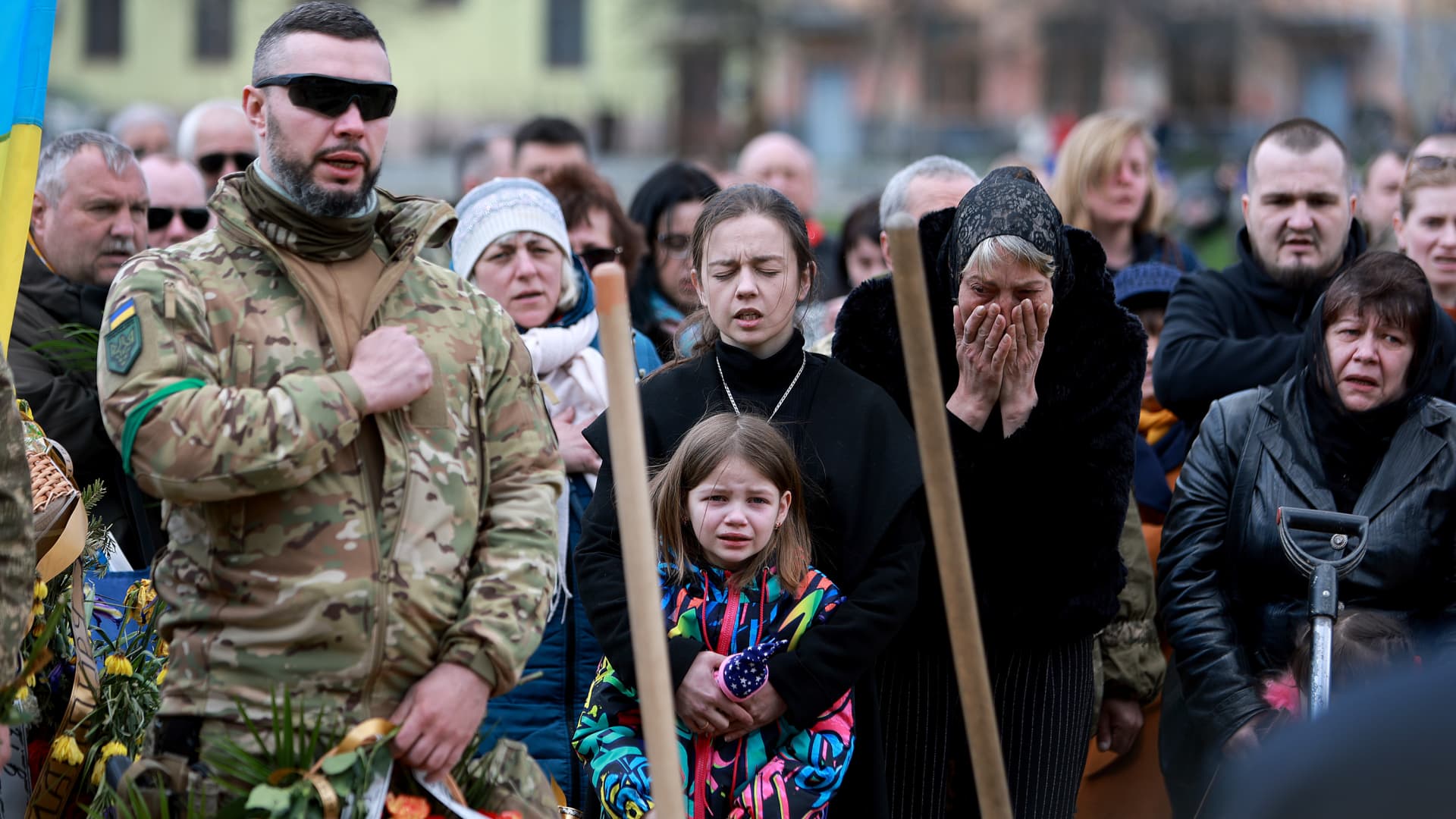
Donbas is a coal- and natural gas-rich part of eastern Ukraine that contains the Donestsk and Luhansk provinces.
"Russia's ability to progress continues to be impacted by the environmental, logistical and technical challenges that have beset them so far, combined with the resilience of the highly-motivated Ukrainian armed forces," the U.K. ministry said.
CNBC was unable to independently confirm the British assessment, though Russian troops are widely known to have redeployed to Donbas since retreating from Kyiv and other areas in the west.
The press office of the Russian Ministry of Defense was not immediately available to respond to CNBC's request for comment.
— Ted Kemp
Lockheed Martin plans to ramp up production amid massive arms transfers to Ukraine, CEO says
Lockheed Martin CEO Jim Taiclet told CNBC that the world's largest weapons manufacturer plans to ramp up production in order to meet higher arms demand due to Russia's war in Ukraine.
"This is, unfortunately, a game-changing event," Taiclet said in an exclusive interview on "The Exchange," reflecting on massive arms transfers the U.S. and its allies have carried out in the nearly two months since Russia invaded Ukraine.
"The kinds of capabilities our company and our cohort companies have in aerospace and defense are going to get more important over time and stay that way for a while," Taiclet said, adding that Lockheed Martin plans to accelerate production in order to supply depleted U.S. weapons arsenals.
"The importance of deterrence, which I feel like Lockheed Martin's product really is deterrence, the value of deterrence to society and to the free market economies of the world is the highest it's been since the middle of the 20th century," he said.
— Amanda Macias
U.S. plans to announce another colossal military aid package for Ukraine
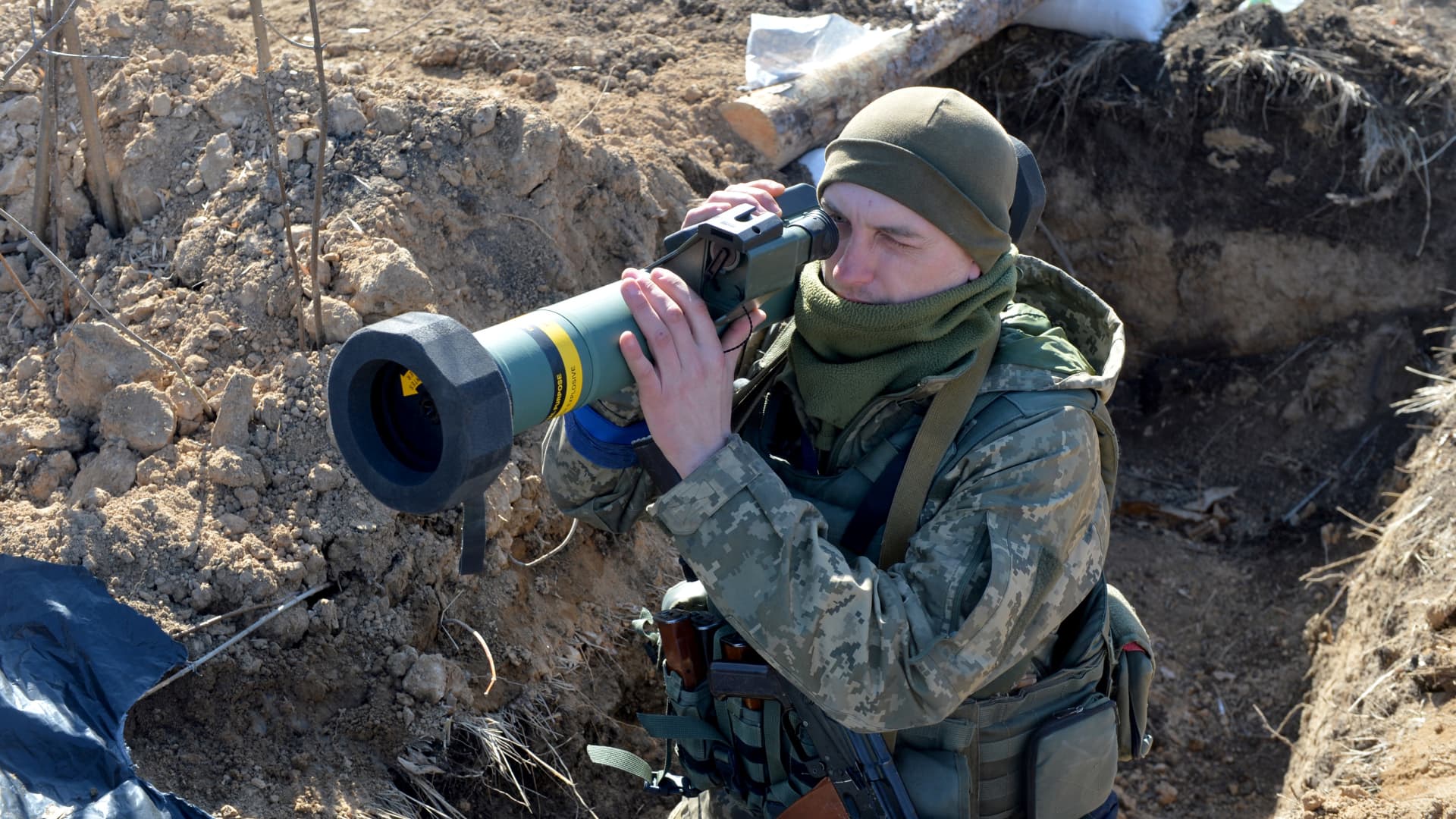
The Biden administration is expected to announce another substantial security assistance package for Ukraine this week, five U.S officials familiar with the matter tell NBC News.
The package is set to be about the same size as the $800 million military aid package Biden announced last week, three of those officials said.
Earlier in the day, Biden himself confirmed that the U.S. will send more artillery to Ukraine.
The United States has already provided more than 50 million rounds of ammunition to Ukrainian forces. But as troops go through tens of thousands of rounds a day, and fiercer fighting is expected in the coming weeks, there is an urgent need for additional aid.
Pentagon spokesman John Kirby declined to detail items in the upcoming weapons package during a briefing at the Defense Department, citing security concerns.
— Amanda Macias and Christina Wilkie
Pentagon declines to detail additional U.S. firepower going to Ukraine
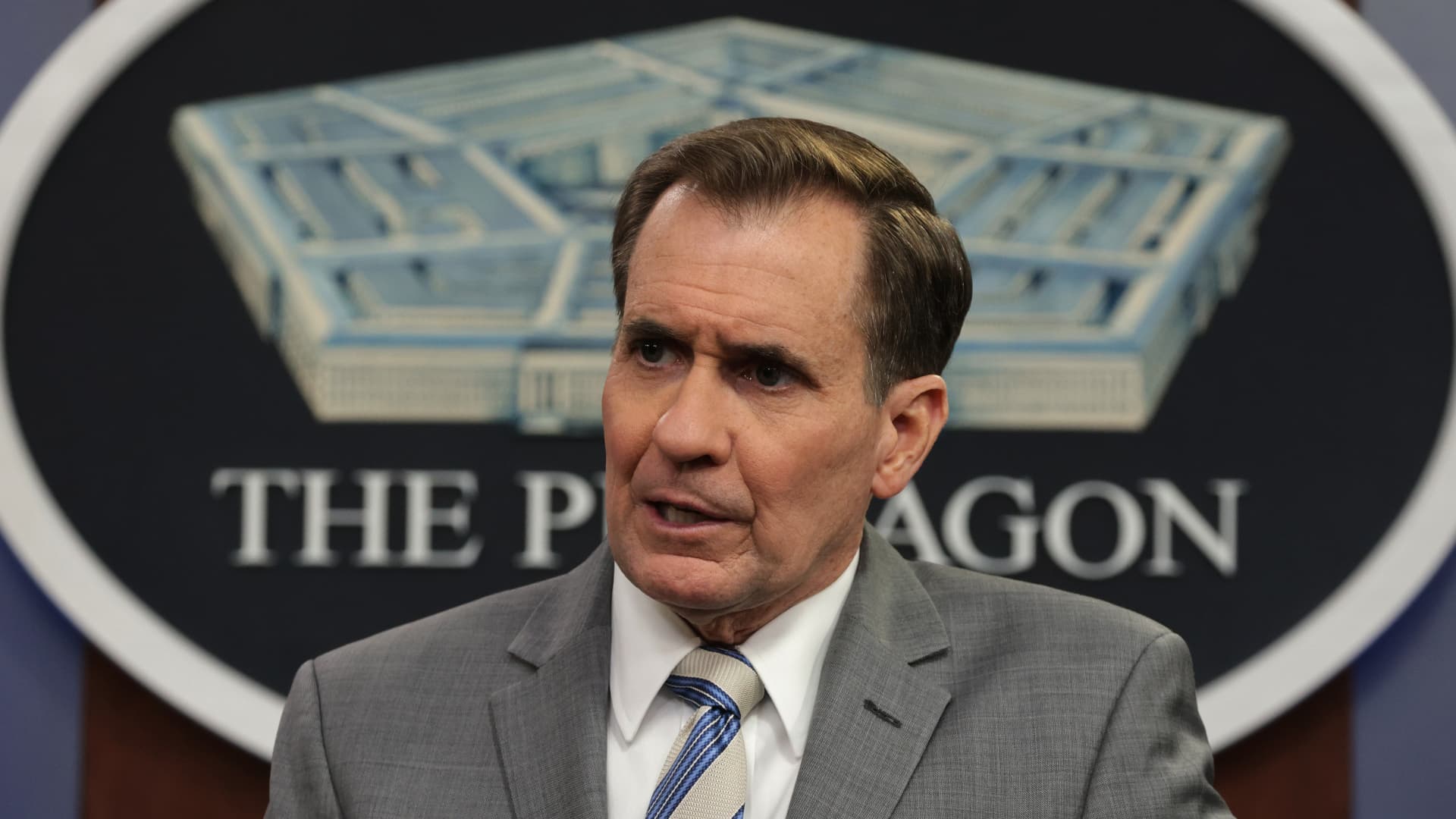
The Pentagon declined to detail the firepower the U.S. plans to send to Ukraine, after President Joe Biden confirmed that more assistance is on the way.
"I'm not going to get ahead of any announcement," Pentagon spokesman John Kirby told reporters during a briefing. When pressed, Kirby said that due to operational security the Pentagon was unable to elaborate on specific weapon systems and timelines.
The military assistance is set to be similar in size to the $800 million aid package announced last week, NBC News reported.
Kirby added that the U.S. had no indication that any U.S. weapons have fallen into the hands of Russian forces.
Earlier in the day, a senior U.S. Defense official said that the Pentagon expects to send another seven military aircraft carrying security assistance for Ukraine in the next 24 hours. The official, who spoke on the condition of anonymity in order to share new details from the Pentagon's assessment of the war, said Western weapons are arriving in the region every day.
— Amanda Macias
Shutting off Russia's gas supply would have been devastating to German economy, German minister says
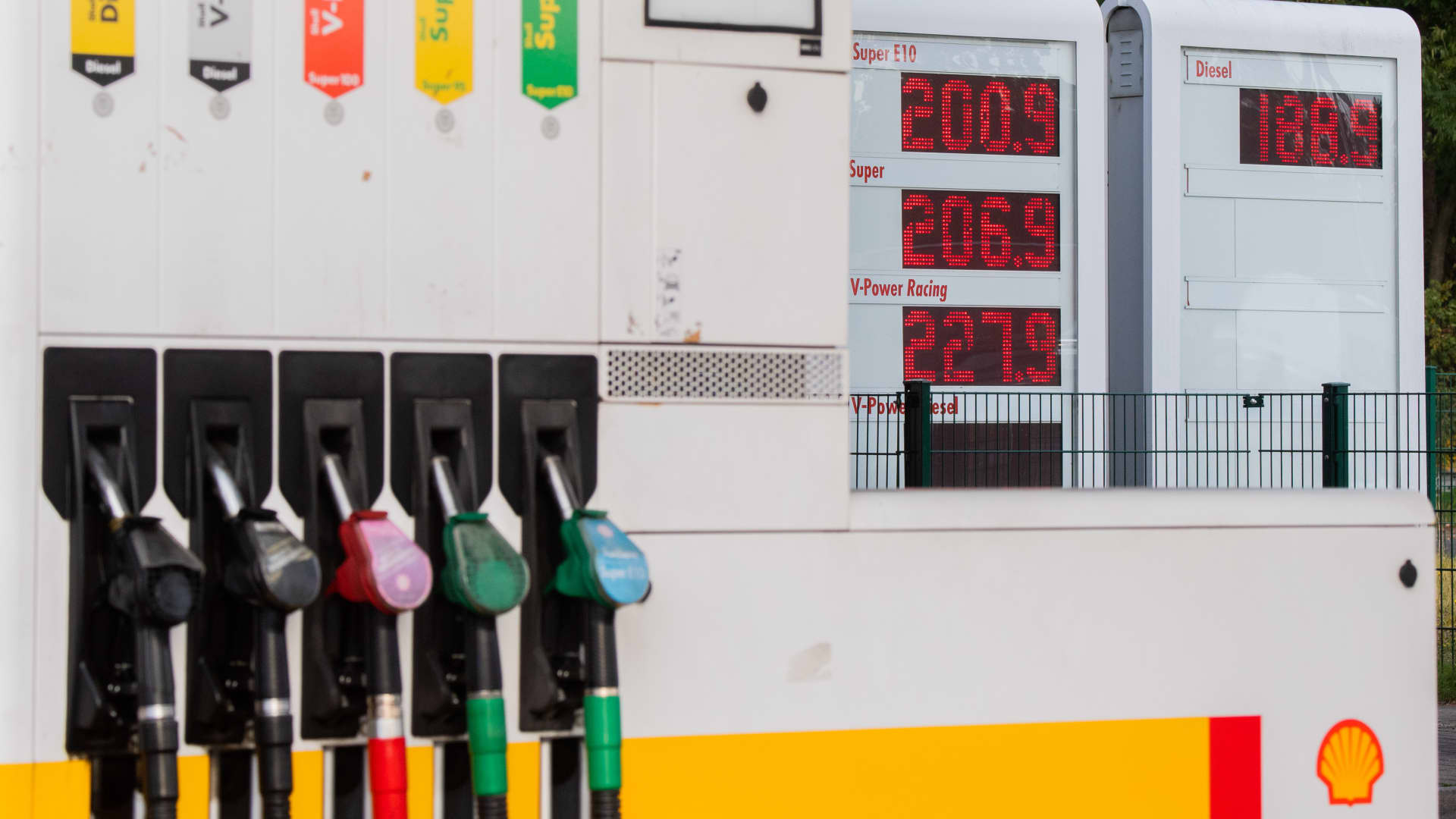
Germany would have been unable to sustain a complete embargo on Russian gas despite pressure to hold Moscow accountable for its unprovoked war in Ukraine, a German official said.
"If we would have had a complete embargo on gas right now, there would have been a very, very high probability we would have to have to take it back by the next winter," said Tobias Lindner, a minister of State at the German Federal Foreign Office. He added, "That would be a victory for Mr. Putin."
Lindner, a German economist, added that shutting off Russia's gas supply would have had devastating effects on various sectors of the German economy.
"Our strategy is to reduce the gas supply as fast as we can but in a sustainable way," he said, adding that Germany is investing in its gas pipeline infrastructure and liquefied natural gas terminals. Lindner said that Germany is also diversifying its gas supply structure so that Berlin does not find itself "dependent on one country as we now are with Russia."
"It was a big mistake in our history to be that dependent as we are in terms of gas," he added.
— Amanda Macias
Biden administration considers labeling Russia a state sponsor of terrorism
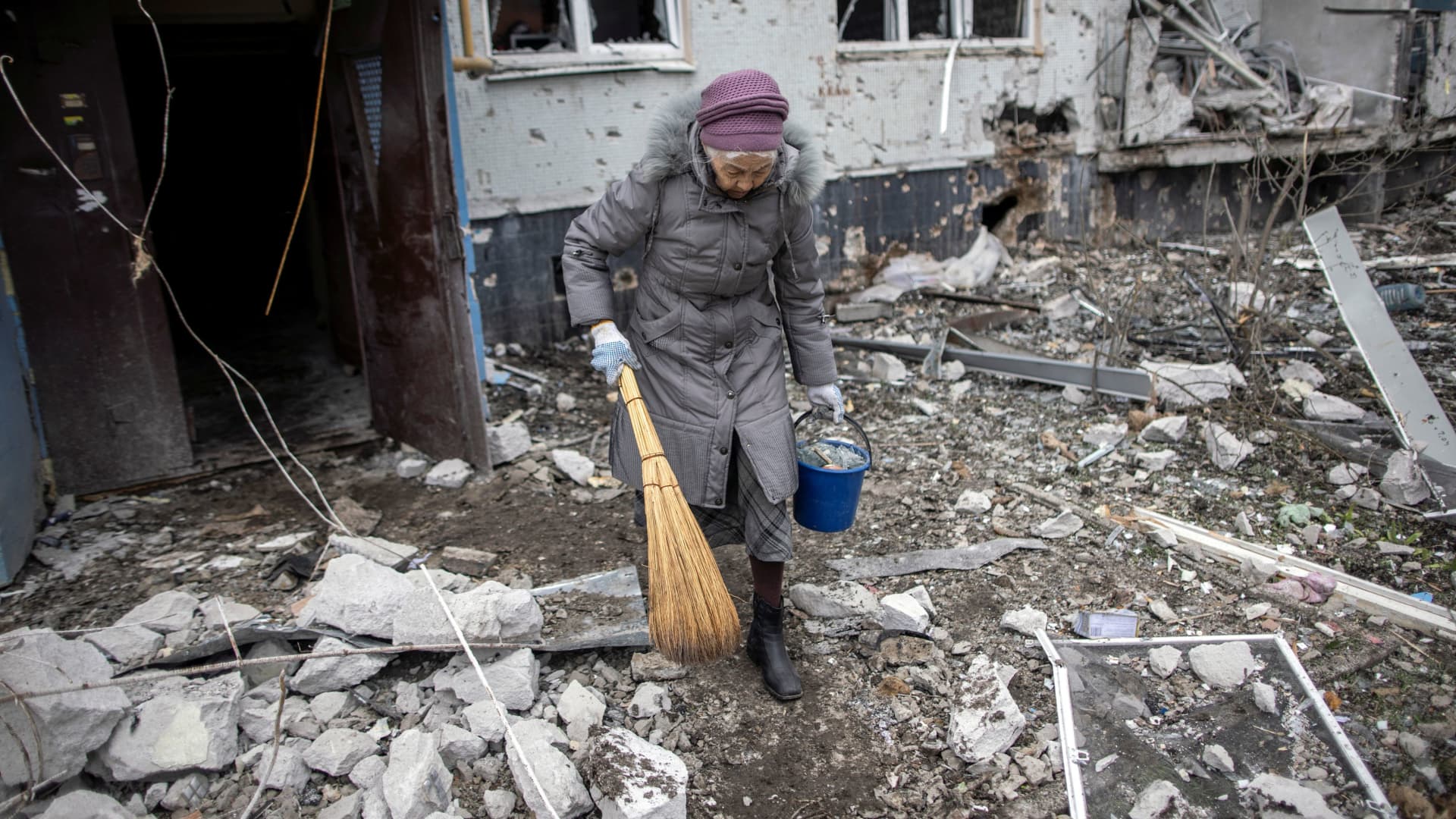
State Department and White House officials say the United States is looking closely at what would be required to designate Russia a state sponsor of terrorism, following Ukrainian President Volodymyr Zelenskyy's recent request to President Joe Biden that the Kremlin be labeled a sponsor of terror.
The officials are largely downplaying the impact that the label would have on the war in Ukraine. They note that most of the specific sanctions triggered by the state sponsor of terror designation have already been imposed on Russia.
If the U.S. were to decide to designate Russia as a state sponsor of terrorism, "the primary value could be in potential negotiations, where the label could be used as a bargaining chip," said Rutgers University professor Alexander Motyl.
But with diplomatic talks all but dead for the moment, it's hard to see what adding Russia to the list of state sponsors of terrorism at this point in the conflict could actually do.
— Christina Wilkie
Russian offensive is prelude to larger operation, U.S. Defense official says
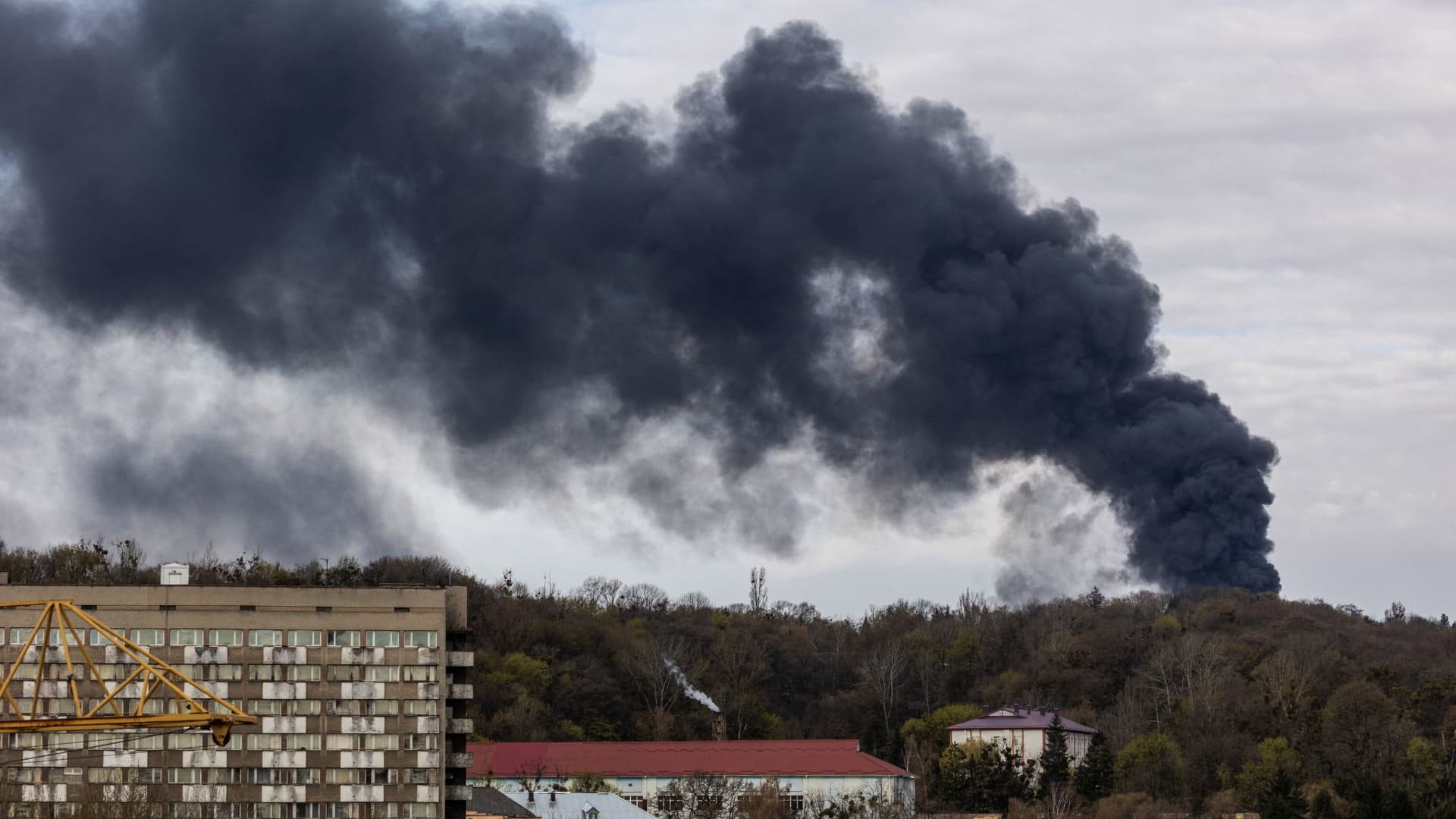
Russian forces have begun a limited offensive in the southwest of Donetsk and south of Izyum, a new movement that aligns with Western intelligence that the Kremlin would shift its focus away from Ukraine's capital Kyiv, a senior U.S. Defense official said.
"We think these offensives are preludes to larger offensive operations that the Russians plan to conduct," said the Defense official, who spoke on the condition of anonymity in order to share new details from the Pentagon's assessment of the war.
The official added that the U.S. has observed some ground offensives, including some long-range fires and artillery bombardment. The official also said that not all of Russia's troops have redeployed to the fight in Ukraine, nothing that some Russian units are still resupplying.
— Amanda Macias
Biden confirms U.S. will send more artillery to Ukraine
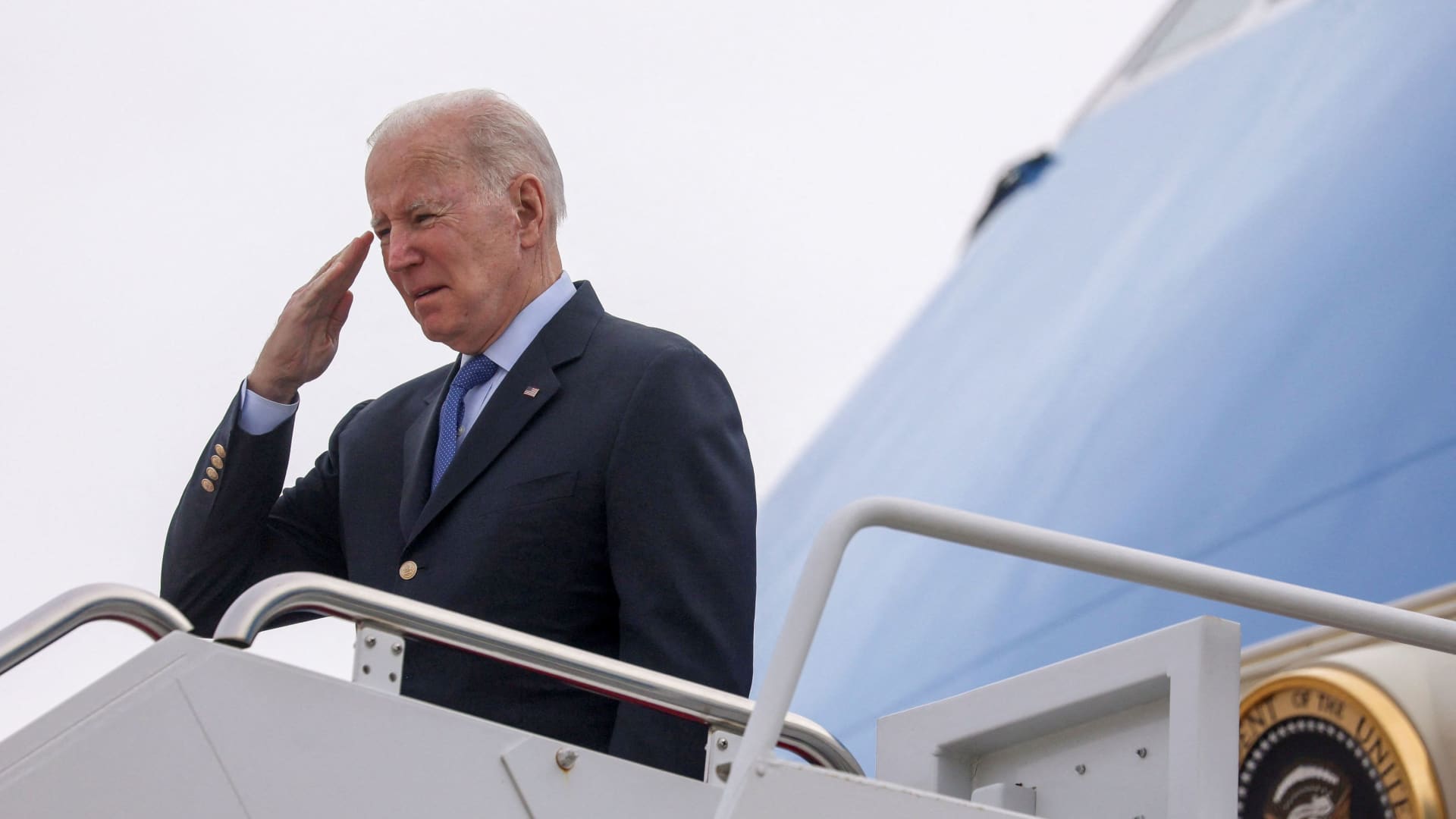
Just days after announcing an $800 million package of U.S. military aid to Ukraine, President Joe Biden confirmed that more artillery is on the way.
Biden is in Portsmouth, New Hampshire for the day to focus on infrastructure and as he deplaned, he was asked whether he planned to send more artillery to Ukraine. Biden paused and replied, "Yes."
This week marked the first time that the United States has sent Ukrainian forces howitzer artillery cannons, heavy weapons that require training to use properly.
On Monday, Pentagon spokesman John Kirby said U.S. service members would train a small number of Ukrainians on how to use the howitzers before sending them into Ukraine.
— Christina Wilkie
UN chief calls for four-day halt to fighting in Ukraine
U.N. Secretary-General António Guterres is calling for a four-day halt in fighting in Ukraine, starting Thursday to coincide with Orthodox Christians' Holy Week observances.
Noting that Orthodox Easter is coming amid an intensifying Russian offensive in eastern Ukraine, the U.N. chief said that the need for a "humanitarian pause" is all the more urgent.
Guterres said the goal is to allow for evacuating civilians from "current or expected areas of confrontation" and or getting more humanitarian aid into desperately needy places such as Mariupol, Donetsk, Luhansk and Kherson. More than four million people in those areas need assistance, Guterres said.
U.N. humanitarian chief Martin Griffiths traveled to Ukraine and Russia earlier this month to try to gauge the potential for a cease-fire and emerged saying he wasn't optimistic at the time. Griffiths broached the idea of a Holy Week pause with the Ukrainian Council of Churches and Religious Organizations, an interfaith group, Guterres said.
"The four-day Easter period should be a moment to unite around saving lives and furthering dialogue to end the suffering in Ukraine," the U.N. chief said.
— Associated Press
Greece impounds Russian oil tanker as part of EU sanctions
Greece has impounded a Russian oil tanker off the island of Evia, the Greek coastguard said, as part of European Union sanctions imposed on Moscow over its invasion of Ukraine.
— Reuters
China will 'continue to strengthen strategic coordination with Russia,' Chinese vice foreign minister says

China's Vice Foreign Minister Le Yucheng reiterated to Russia's Ambassador to China Andrey Denisov that Beijing intends to maintain its "high-level development" and "comprehensive strategic partnership" with Moscow.
"No matter how the international landscape may change, China will continue to strengthen strategic coordination with Russia for win-win cooperation, jointly safeguard the common interests of the two countries and promote the building of a new type of international relations and a community with a shared future for mankind," Le said, according to a readout of a meeting between the diplomats.
During the bilateral meeting, the two also discussed ways to "deepen cooperation in various fields" and talked about the war in Ukraine, according to a readout from China's Ministry of Foreign Affairs.
On Monday, the Biden administration said it had not yet seen China provide material or financial support to Russia for its invasion of Ukraine.
"If the PRC were to provide weapons, supplies or seek to help Russia evade sanctions, there would be strong consequences for that," State Department spokesman Ned Price said during a daily briefing.
— Amanda Macias
IMF cuts global growth forecasts on Russia-Ukraine war
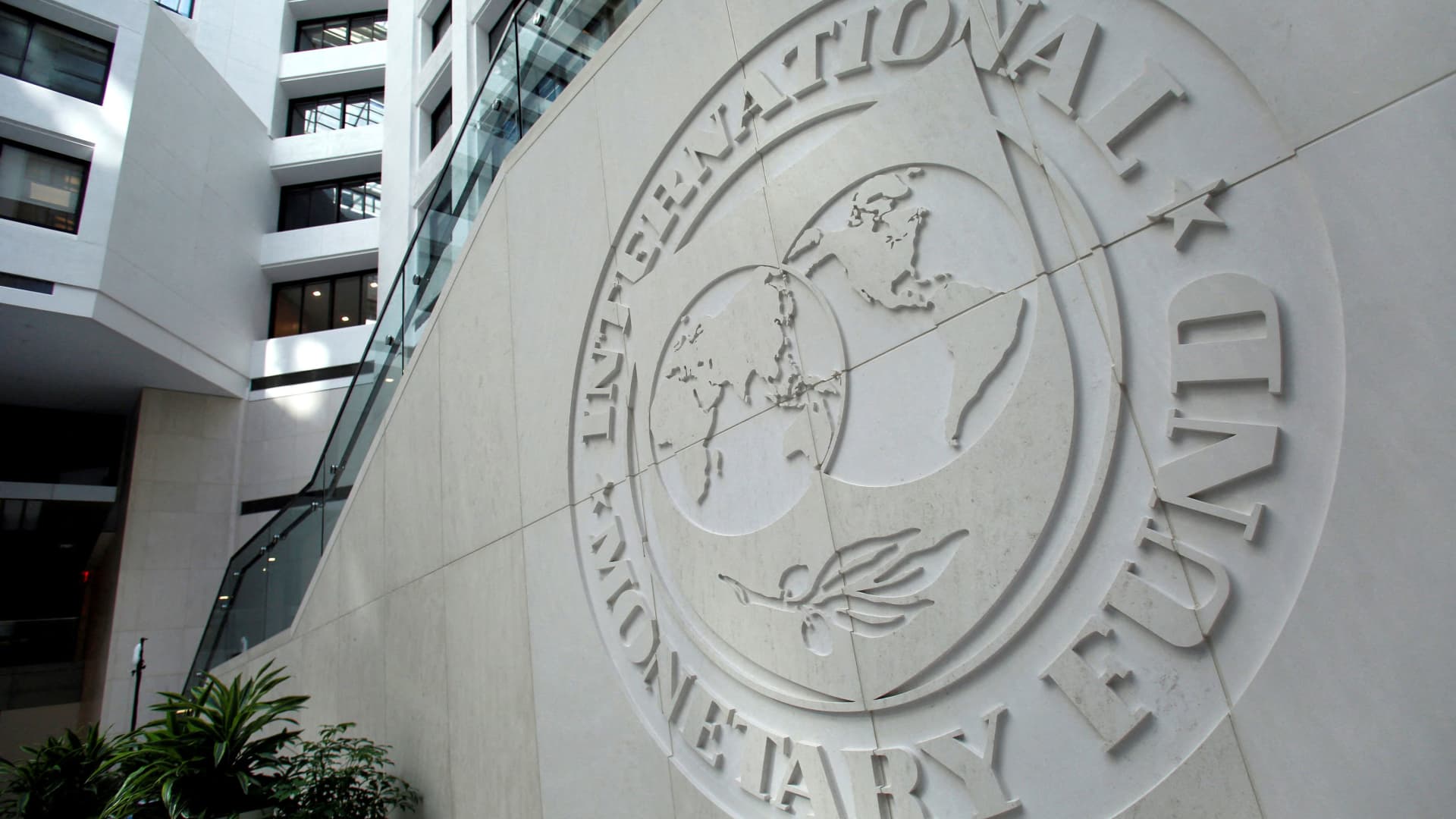
The International Monetary Fund has cut its global growth projections for this year and the next as the economic hit from Russia's unprovoked invasion of Ukraine will "propagate far and wide."
The Washington-based institution is now projecting a 3.6% gross domestic product rate for the global economy this year and for 2023. This represents a 0.8 and 0.2 percentage point drop, respectively, from forecasts presented in January.
The Fund has forecast an even bleaker assessment for the Ukrainian economy.
"For 2022, the Ukrainian economy is expected to contract by 35%," the IMF said in its latest economic assessment, while adding that precise measures of the economic hit from the war are impossible to know. "Even if the war were to end soon, the loss of life, destruction of physical capital, and flight of citizens will severely impede economic activity for many years to come," the institution also said.
— Silvia Amaro
The survivors of Bucha wait for humanitarian aid
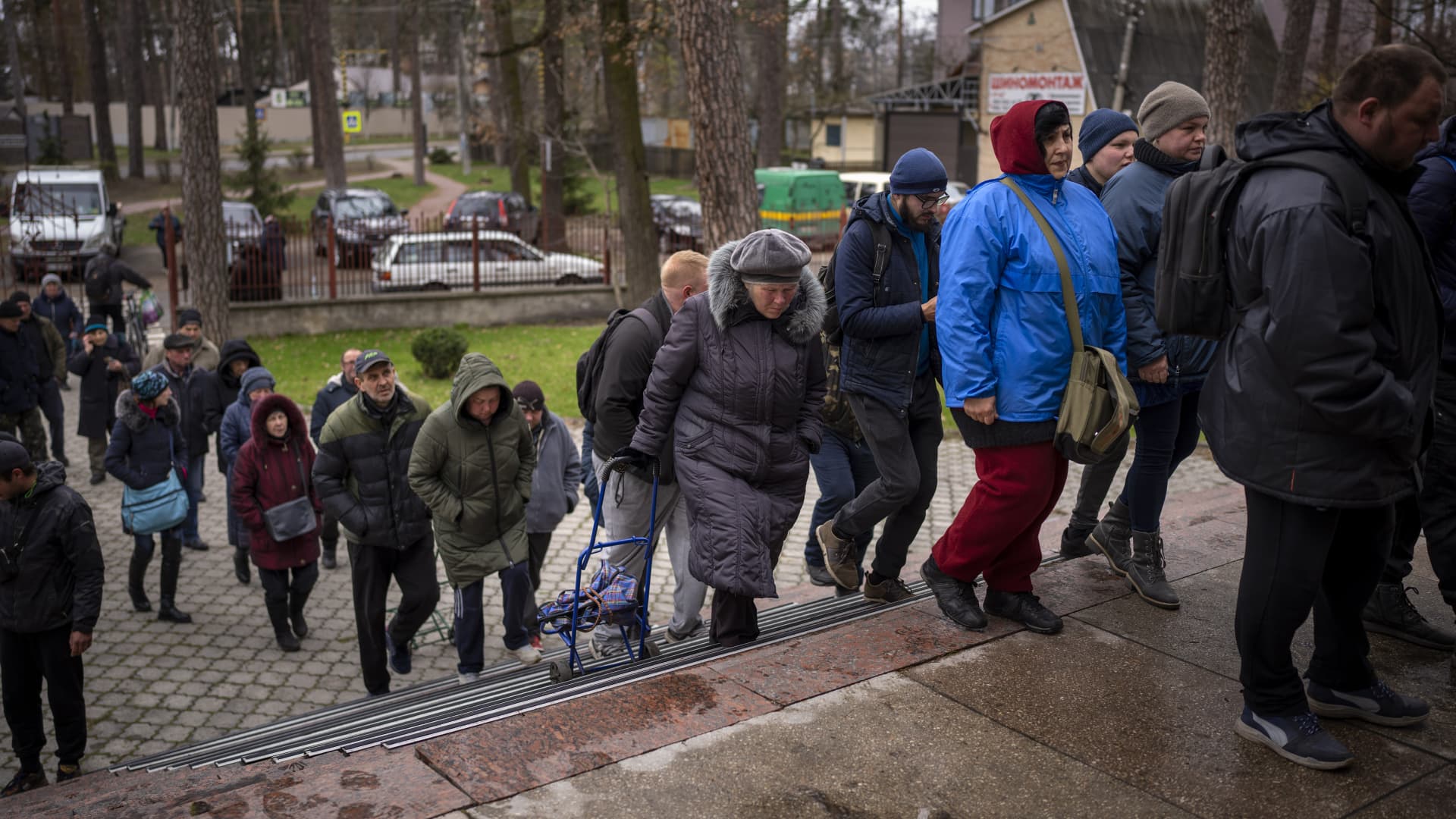
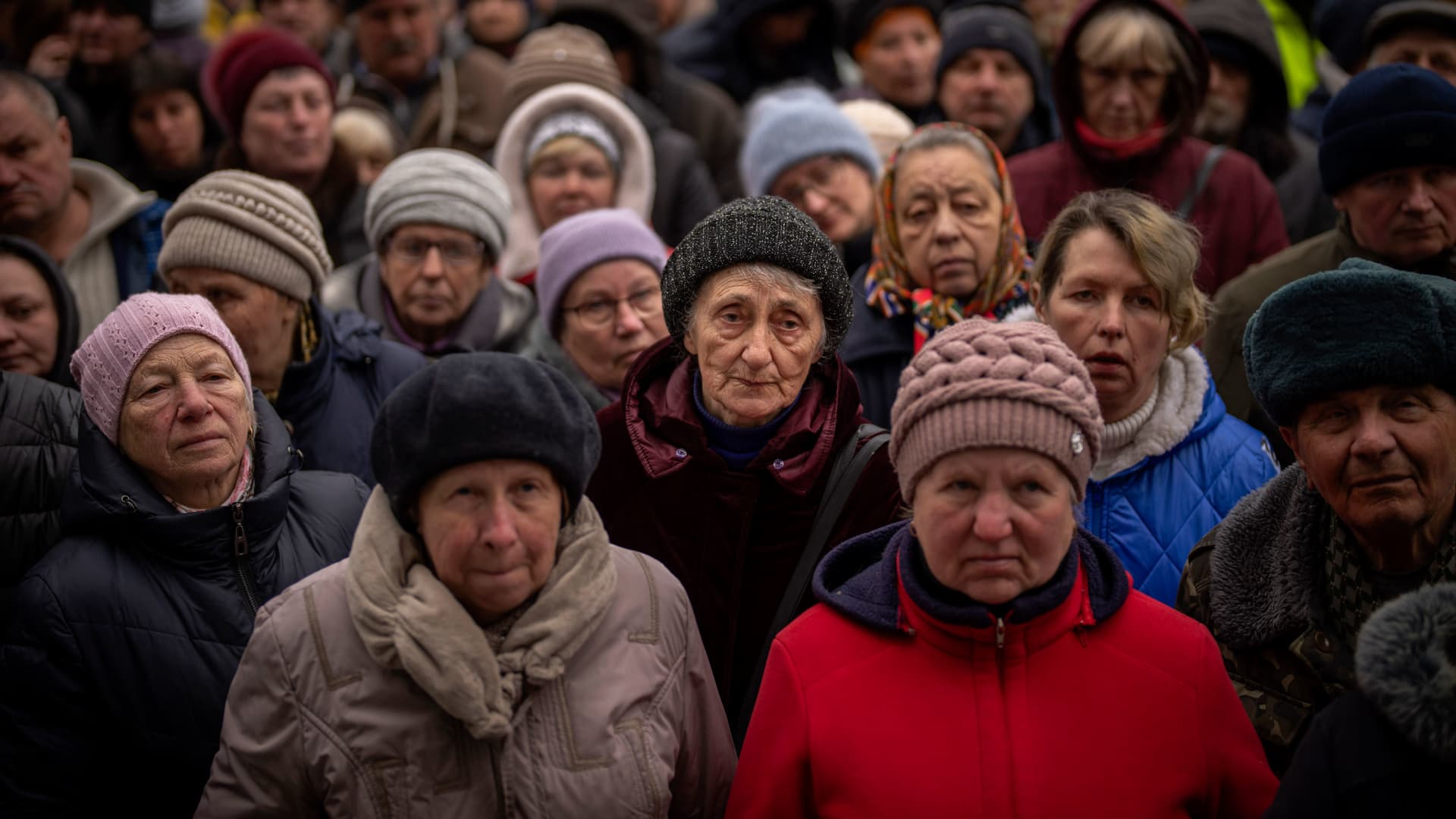
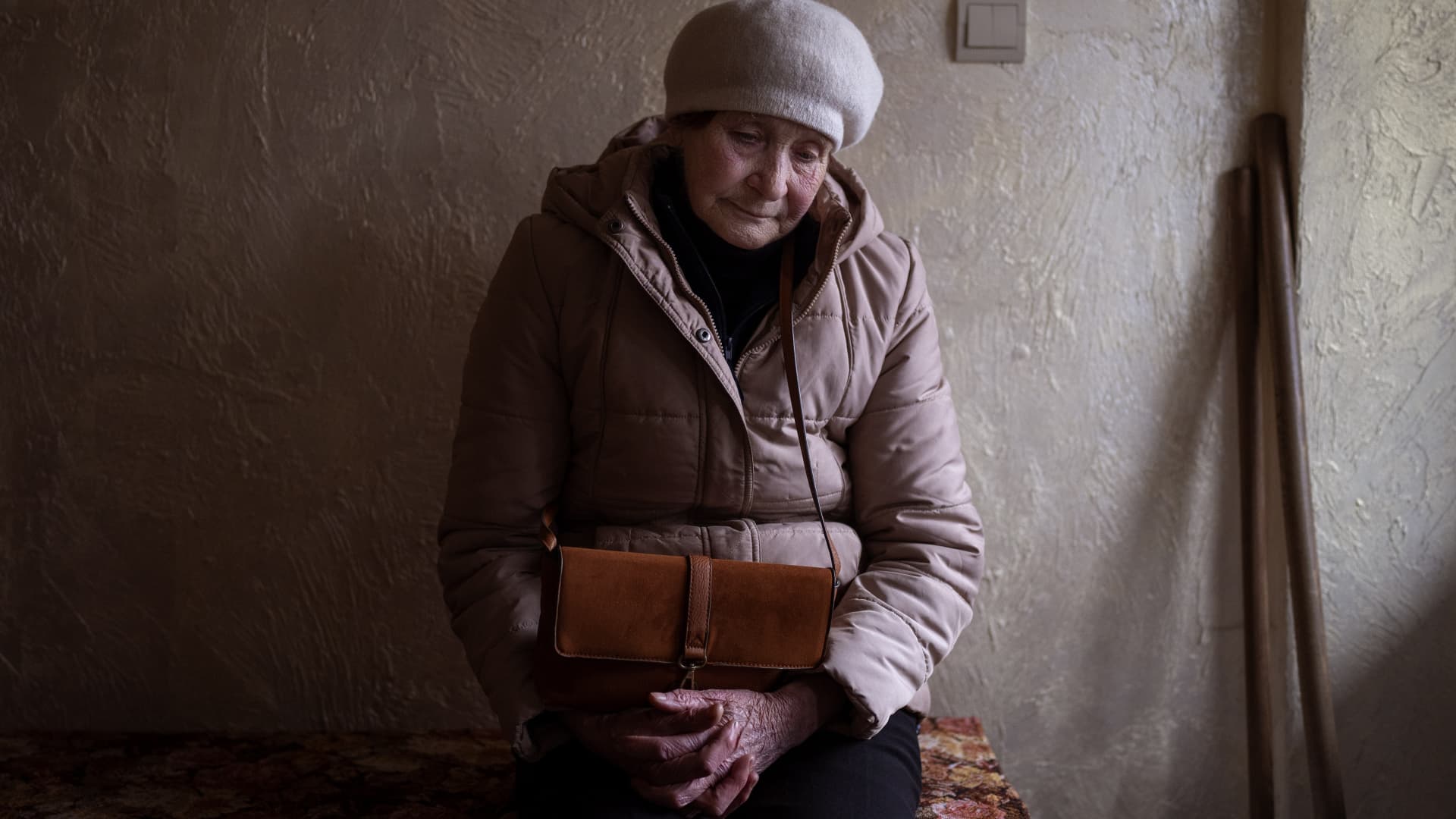
— Associated Press
Nearly 5 million Ukrainians have fled since start of Russian invasion: UN
Nearly 5 million Ukrainians have fled their country since Russia's invasion began on Feb. 24, the United Nations' refugee agency said Tuesday, expressing concern that the situation is likely to become worse as Russia intensifies its assault on eastern Ukraine.
The UNHCR says that 4,980,589 Ukrainians have left since the war started, an increase of 46,174 from the previous day.
And nearly 215,000 third-country nationals, who are primarily students and migrant workers, have also fled to nearby countries — meaning roughly 5.2 million people have left Ukraine in total due to the conflict, according to the U.N.'s International Organization for Migration.
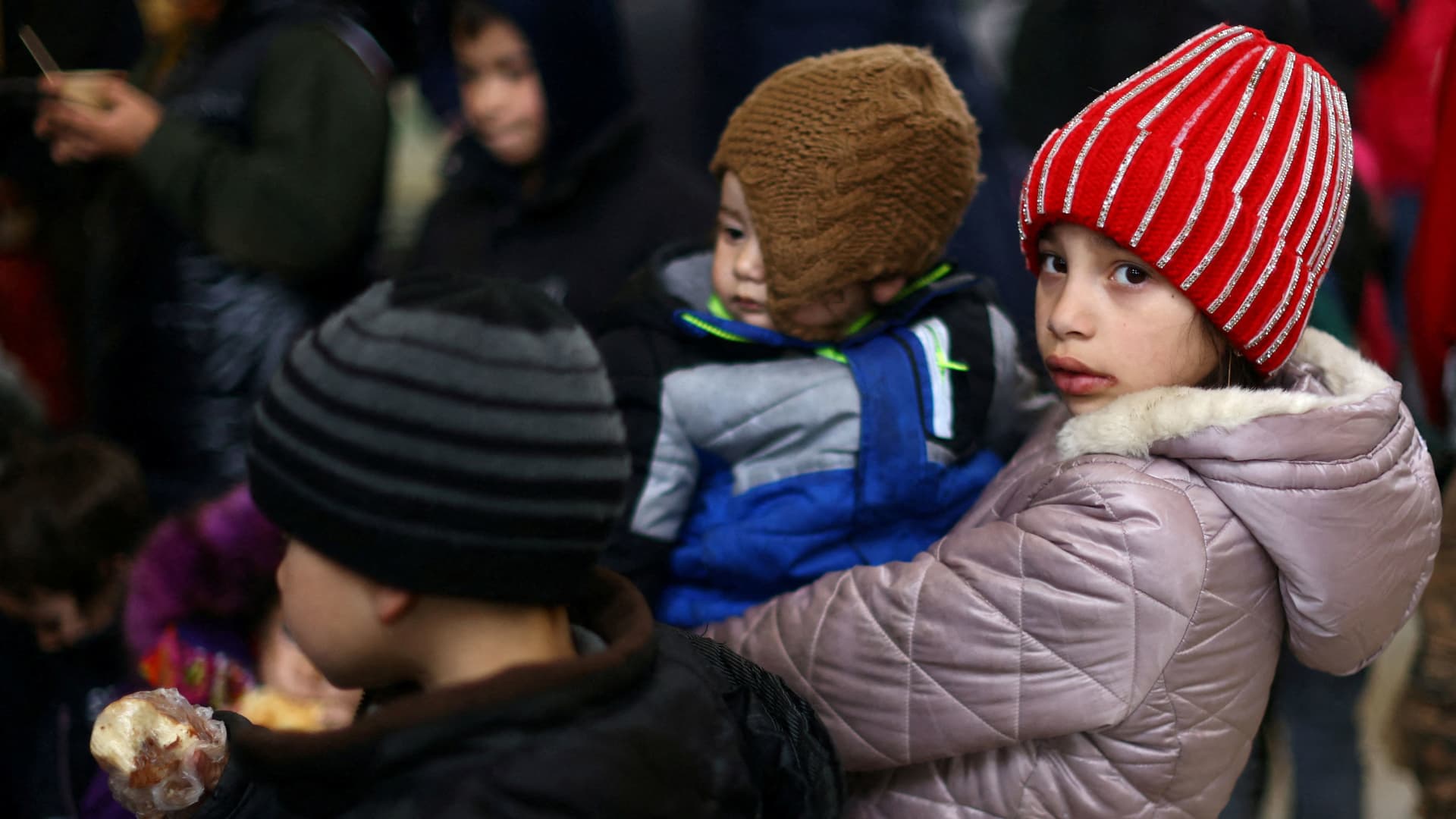
U.N. officials and European leaders say it is the fastest-growing refugee crisis Europe has seen since World War II.
"The key is that the borders remain open, people can access safety and when they get to the neighboring countries they have access to assistance," UNHCR spokeswoman Shabia Mantoo said at a press conference in Geneva.
"We're watching with concern to see what will happen but it's quite alarming that within the space of a few weeks, we are approaching five million refugees from Ukraine," she said.
— Natasha Turak
3 reasons why Russia is shifting its war machine to east Ukraine
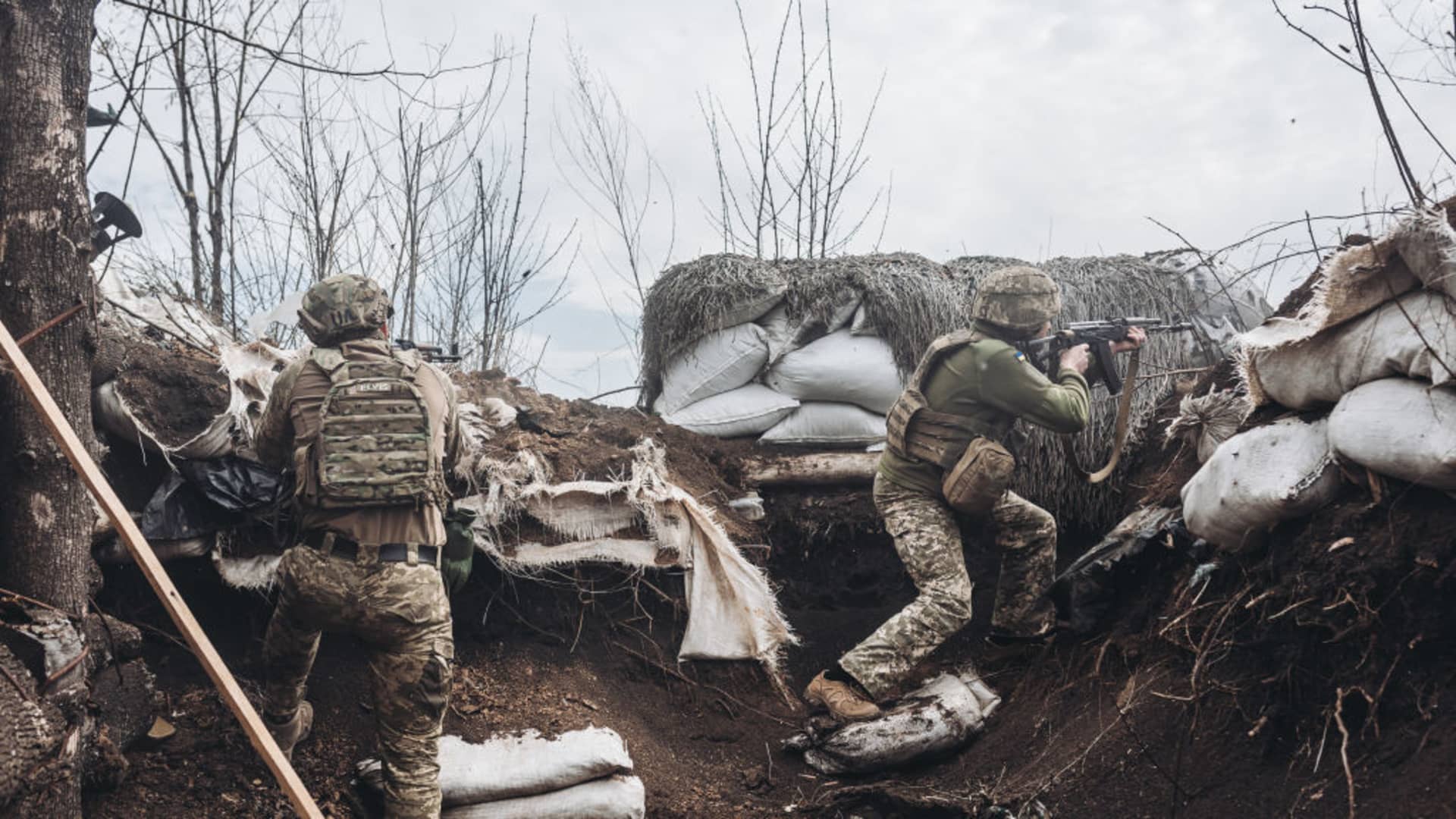
As the "battle for Donbas" gets underway in eastern Ukraine, there are several motives behind Russia's decision to concentrate its war machine on the region.
The Donbas has become an increasingly important target for the Kremlin and a way for it to achieve some of its key strategic, political and economic objectives, particularly after a number of its offensives in other parts of the country have not gone to plan.
CNBC takes a look at the three main reasons why Russia is now focusing on eastern Ukraine. Read more here.
— Holly Ellyatt
UN says 2,104 killed in Ukraine since start of war, warns death toll is likely higher
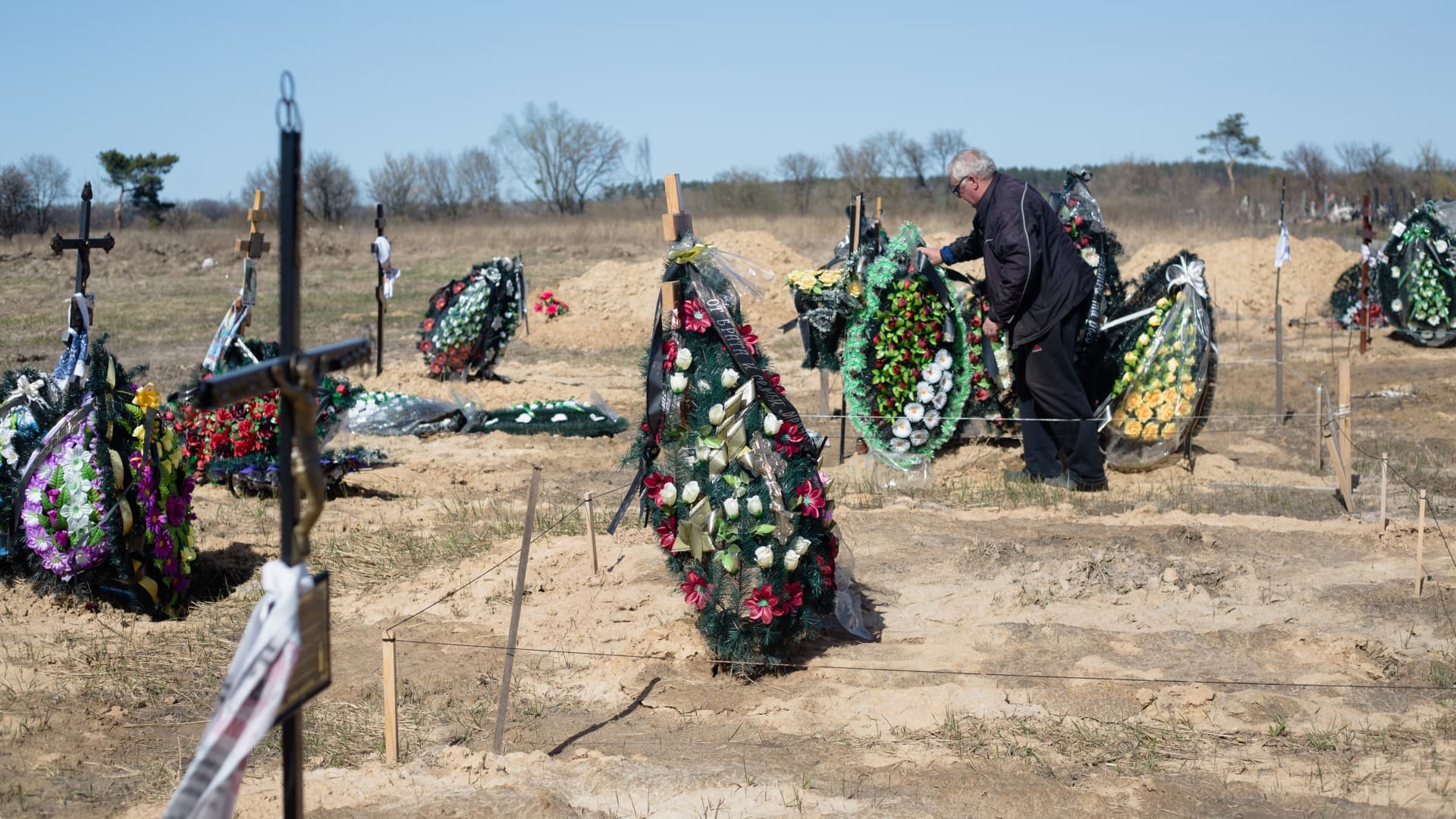
The United Nations says it has confirmed 2,104 civilian deaths and 2,862 injuries in Ukraine since Russia invaded its ex-Soviet neighbor on Feb. 24.
Of those killed, the U.N. has identified at least 39 girls and 60 boys, as well as 71 children whose gender is unknown.
The Office of the UN High Commissioner for Human Rights said Monday that the death toll in Ukraine is likely higher, citing delayed reporting due to the armed conflict.
The international body said most of the civilian casualties recorded were caused by the use of explosive weapons, including shelling from heavy artillery and multiple launch rocket systems, as well as missiles and airstrikes.
— Amanda Macias
Russia says it launched dozens of strikes across eastern Ukraine overnight
Russia's defense ministry says it launched dozens of airstrikes overnight across eastern Ukraine, detailing that it had hit 13 Ukrainian positions in the Donbas with "high-precision air-based missiles" and had struck "60 military assets" with other airstrikes.
The statement came shortly after Kyiv announced that Russia had started its new and doubled-down offensive on the Donbas region, marking a "second phase" in the war.
Moscow has so far not formally described its actions as a new offensive but its defense chief emphasized Russia's aim of seizing Ukraine's strategic eastern territories.
"We are gradually implementing our plan to liberate the Donetsk and Lugansk People's Republics," Russian Defense Minister Sergei Shoigu said, referring to eastern Ukraine's two breakaway regions which Moscow has recognized as independent. Ukraine's government refutes that claim, pointing to the violent bombardment of the areas carried out by Russian forces.
— Natasha Turak
Macron says his communication with Putin has halted, but doesn't rule out speaking again
French President Emmanuel Macron said his communication with Russia's Vladimir Putin has stopped since the news emerged of Russian atrocities against civilians in Ukrainian towns, but that he remains open to dialogue.
"Since the massacres we have discovered in Bucha and in other towns, the war has taken a different turn, so I did not speak to him again directly since, but I don't rule out doing so in the future," Macron told France 5 television in an interview.
Russia has denied being involved in the massacres of civilians in Bucha and elsewhere.
Asked why he had not visited Kyiv as several other European leaders have, Macron explained that he would visit only if it were to contribute something useful.
"I will go back to Kyiv, but I will go there to bring something useful with me ... because it's obvious that I don't need to travel there to show this support. If I go to Kyiv, it will be to make a difference," Macron said. He added that he and his Ukrainian counterpart Zelenskyy had spoken some 40 times since the Russian invasion began.
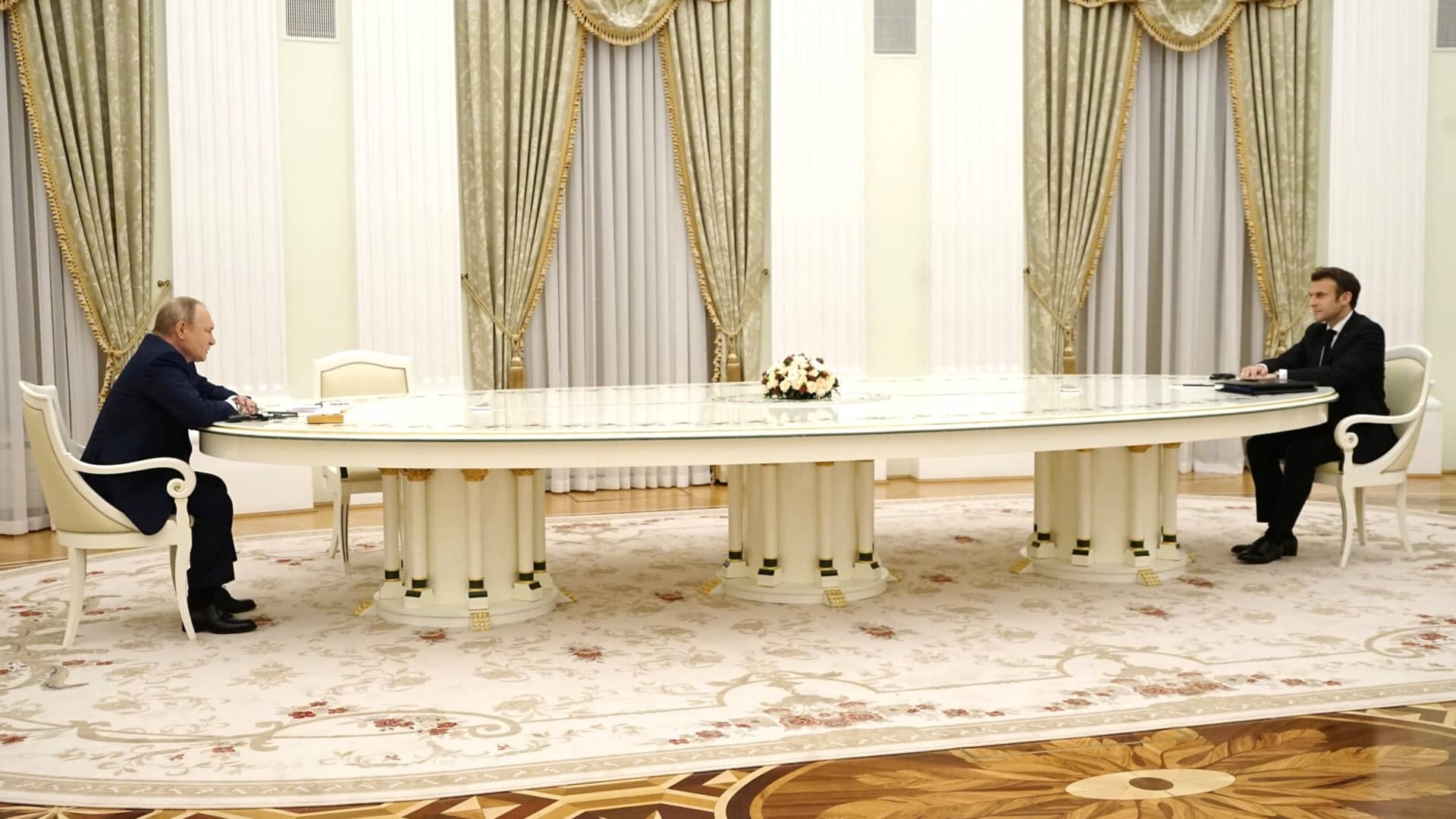
— Natasha Turak
A plane from Moscow picking up Russians in Spain made a 9,300 mile detour due to EU ban
A plane from Moscow sent to pick up Russian diplomats in Spain and then Greece had to make a 9,320-mile detour because of the EU's flight ban on Russian airliners, according to data from flight tracking site FlightRadar24.
"While Spain and Greece made a one-time exception for the aircraft to enter their airspace, the flights navigated around other countries that maintain bans on Russian flights," the website wrote in a blog post.
The distance the airliner flew, the flight tracker said, was "just shy of the current world's longest flight between Singapore and New York."
— Natasha Turak
Biden to hold secure call with allies on Ukraine
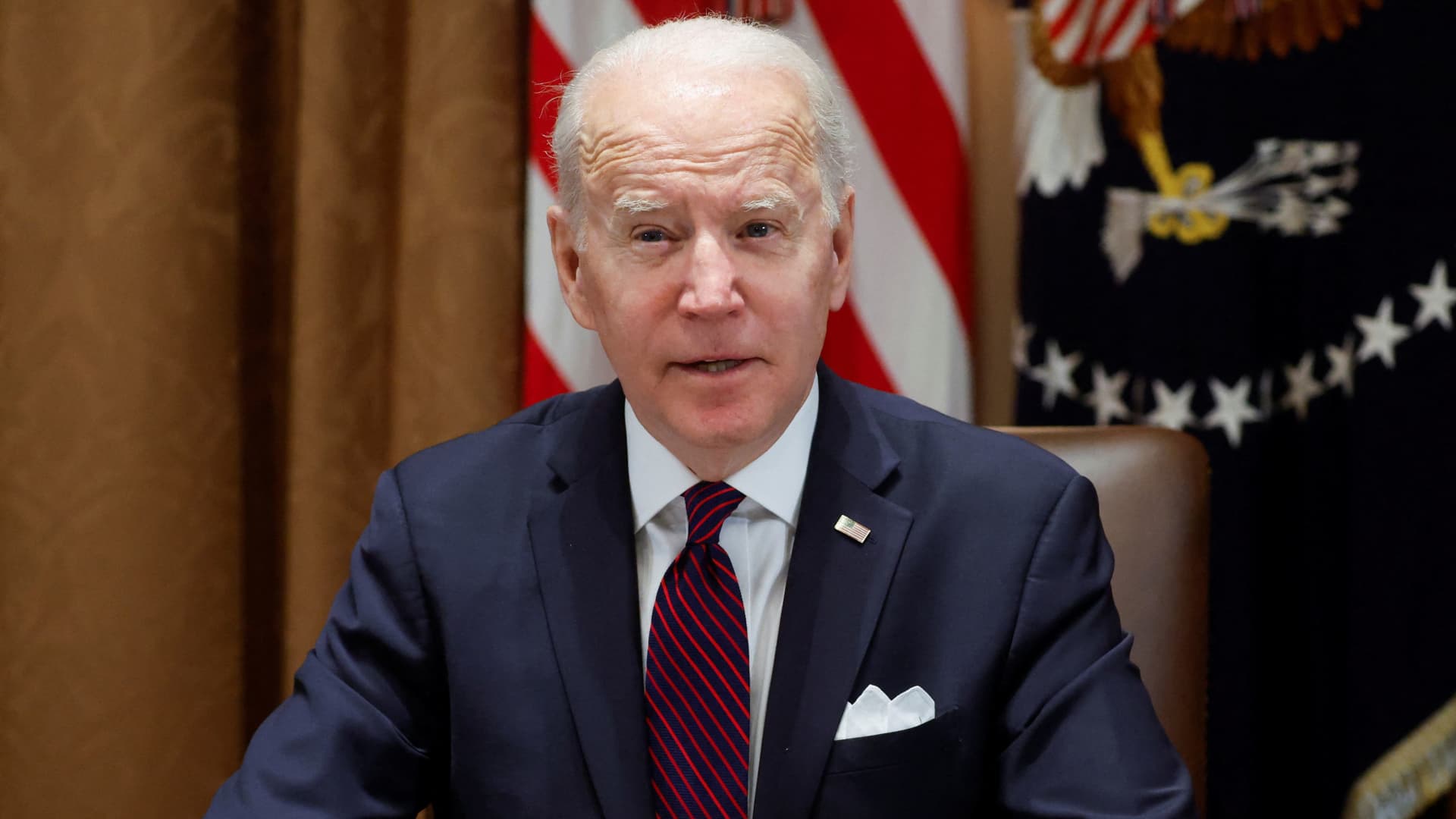
President Joe Biden is slated to convene a secure video call with allies and partners to discuss Russia's ongoing war in Ukraine.
The video conference, which is scheduled for 9:45 E.T., will be held in the Situation Room in the White House.
Biden will also discuss with allies continued support for Ukraine and additional efforts to hold Russia accountable, the White House said in a statement.
— Amanda Macias
Russian troops seize city of Kreminna: Regional governor
Russian forces have reportedly captured the eastern Ukrainian city of Kreminna, its regional governor said. This would mark the first city taken by Russia following the start of its doubled-down offensive in Ukraine's Donbas region.
Luhansk regional governor Serhiy Gaidai said in a briefing that Ukrainian troops have withdrawn after three days of fighting.
"Kreminna is under the control of the 'Orcs' (Russians)," Gaidai said. "They have entered the city. Our defenders had to withdraw. They have entrenched themselves in new positions and continue to fight the Russian army."
Kreminna's pre-war population was roughly 20,000. The city is located 62 miles southeast of Kyiv and is a strategic target for Russian forces.
Gaidai said that official statistics count about 200 dead, "but in reality there are many more." He wrote on his official Telegram channel Monday that control over Kreminna had been lost, describing street fights taking place and civilians killed by Russian shelling while trying to flee.
— Natasha Turak
EU oil embargo on Russia is in the works: France's Le Maire
French Finance Minister Bruno Le Maire said that an embargo on Russian oil is in the works at the EU level, speaking in an interview with radio station Europe 1.
"I hope that in the weeks to come we will convince our European partners to stop importing Russian oil," Le Maire said, according to Reuters, adding that French President Emmanuel Macron has long been in favor of the move.
The effort remains a major challenge amid strong pushback from some EU leaders whose countries rely heavily on Russia for their energy needs. Most are reluctant or outright refusing to sanction imports of oil and gas from the country as energy prices are already soaring. In total, the EU in 2020 imported roughly a quarter of its energy from Russia, including 41% of its natural gas and 36% of its oil.
But these sanctions will have to come "sooner or later," European Council President Charles Michel said in early April, as evidence mounted of likely Russian war crimes against civilians in Ukraine. Michel pointed out that the money the EU has sent to Russia for energy purchases since the start of the invasion is roughly 35 times the amount it has sent to Ukraine in aid.
— Natasha Turak
'Second phase' of war has begun, Ukraine's chief of staff says
Russia's offensive in Ukraine has entered its second phase, a top Ukrainian official said.
"Donbas. The second phase of the war has begun, but I will tell you, believe in the Armed Forces," Andriy Yermak, President Zelenskyy's chief of staff, said in a Telegram post, according to a Google translation.
Zelenskyy, in a video address Monday night, vowed to fight back, saying: "No matter how many Russian troops are driven there, we will fight. We will defend ourselves. We will do it every day."
— Natasha Turak
U.N. Secretary-General calls for immediate ceasefire to allow for evacuations
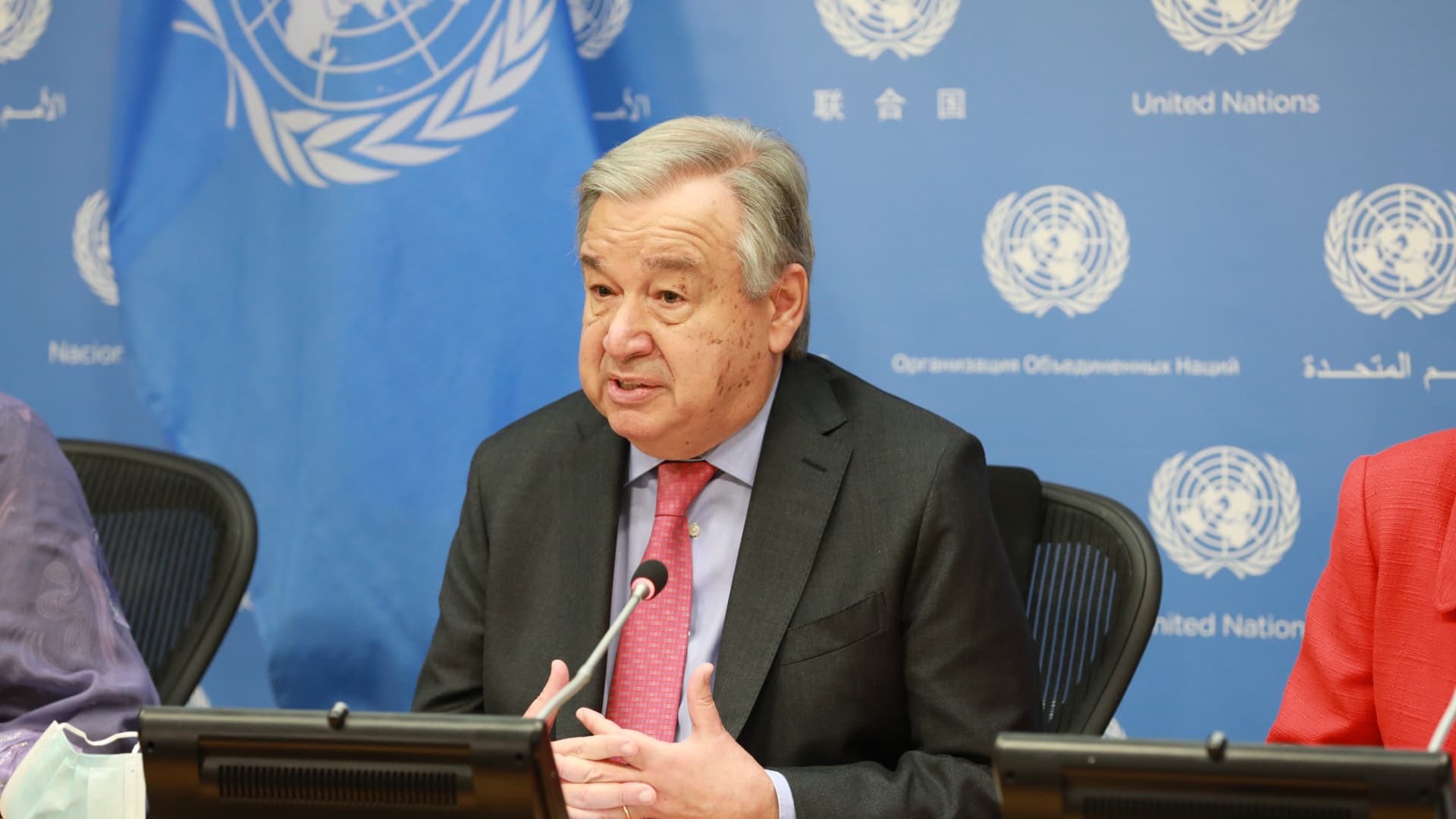
U.N. Secretary-General Antonio Guterres has called for an immediate humanitarian ceasefire between Russia and Ukraine.
"The Secretary-General strongly urges all parties to enact an urgent and immediate humanitarian ceasefire, which will enable the safe and secure functioning of humanitarian corridors, help evacuate civilian residents and also deliver life-saving humanitarian and medical assistance," his spokesperson Stephane Dujarric said.
"Genuine negotiations must be given a chance to succeed and to bring lasting peace," he added.
Earlier, the U.N. said that humanitarian ceasefires in Ukraine were "not on the horizon right now" but could take place in a couple of weeks.
The U.N.'s relief chief Martin Griffiths will be in Turkey this week to meet President Recep Tayyip Erdogan about hosting humanitarian talks between Russia and Ukraine.
The World Health Organization says 12 million people in Ukraine have been displaced, with 7.1 million still in Ukraine.
— Chelsea Ong
Russians refuses to provide humanitarian corridors, Ukraine deputy PM says
Ukraine's Deputy Prime Minister Iryna Vereshchuk said there will be no humanitarian corridors on Tuesday for the third consecutive day.
"Today, 19 April, unfortunately there are no humanitarian corridors. Intense shelling continues in the Donbas. According to Mariupol: the Russians refuse to provide a corridor for civilians in the direction of Berdyansk," she posted on Telegram.
"We continue difficult negotiations on the opening of humanitarian corridors in Kherson and Kharkiv regions."
The news comes as Ukrainian officials say Russia has officially begun its major offensive in the Donbas. State and local leaders have for weeks been urging civilians to flee while they still can.
— Natasha Turak
Zelenskyy: 'Very large part' of Russian army now focused on the east
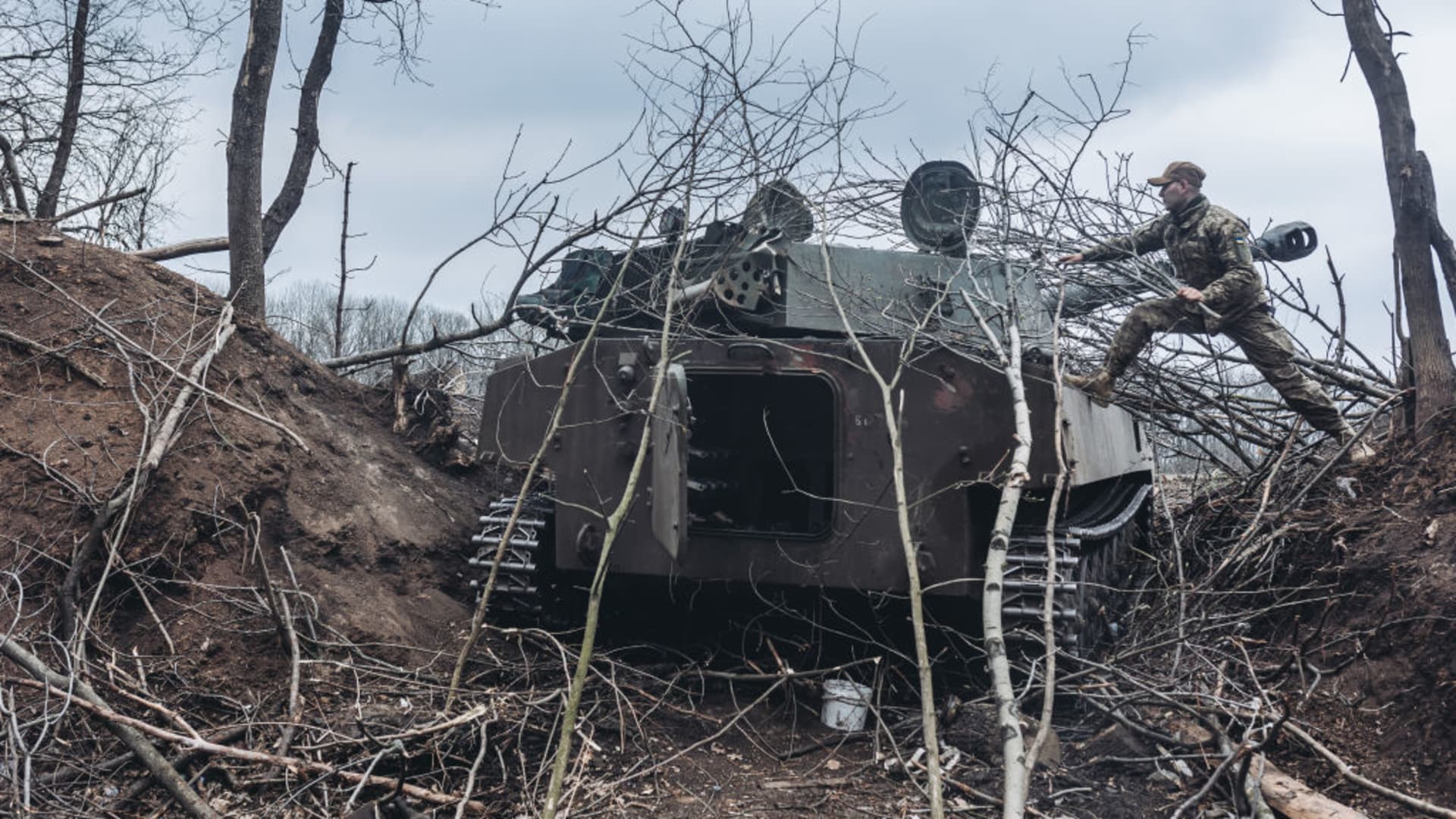
Russia has begun the battle for Donbas, Ukrainian President Volodymyr Zelenskyy said in his nightly video address to the nation.
"A very large part of the entire Russian army is now focused on this offensive," he said.
He also said that Russian forces were increasing pressure in some other regions, with continued rocket strikes.
"Today's strikes at Lviv, at the Dnipropetrovsk region and any other Russian strikes mean only one thing: we, the world and history will take from Russia much more than Russian missiles will take from Ukraine," he said.
He added that the none of the missile strikes have changed the situation for Russia "tangibly."
Zelenskyy also said that Ukraine's accession to the European Union is an "integral" part of post-war reconstruction and the country's future development.
"The status of a candidate for membership in the European Union will open for us unprecedented opportunities in our history for the restoration and modernization of Ukraine," he said.
— Chelsea Ong
Japan to send Ukraine protective gear and drones
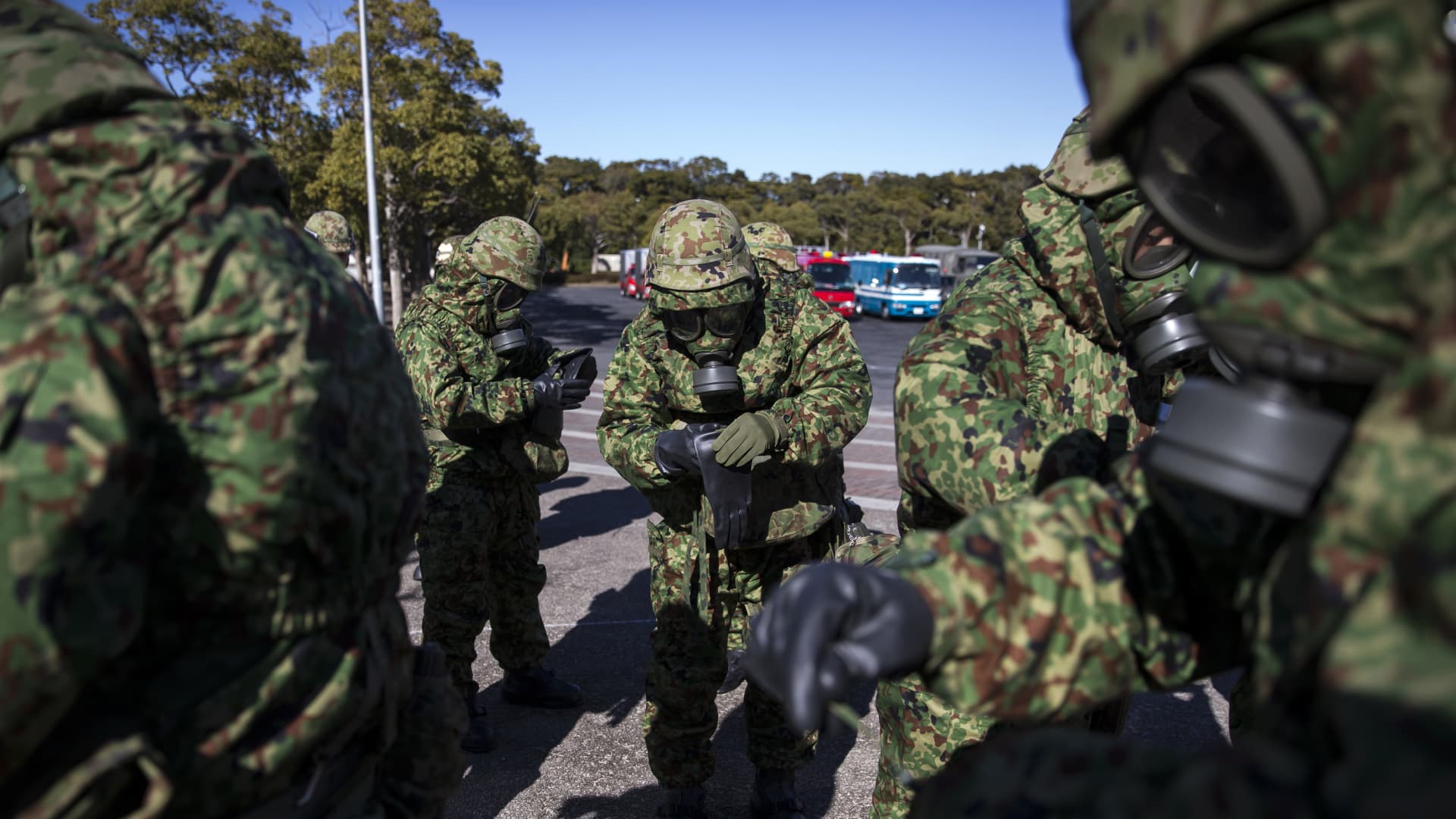
Japan said it will send protective gear and drones to Ukraine as part of its support effort.
Japanese Defense Minister Nobuo Kishi said the items will include masks and clothing meant to protect against chemical weapons, according to Kyodo News.
"We will continue to provide as much support as possible to the Ukrainian government," Kishi told a press conference.
The supplies follow a previous shipment of bulletproof vests and helmets to Ukraine, which Japan's Ministry of Defense had called a "first case for us."
— Chelsea Ong
Russia's planned offensive in eastern Ukraine has begun, Kyiv officials say
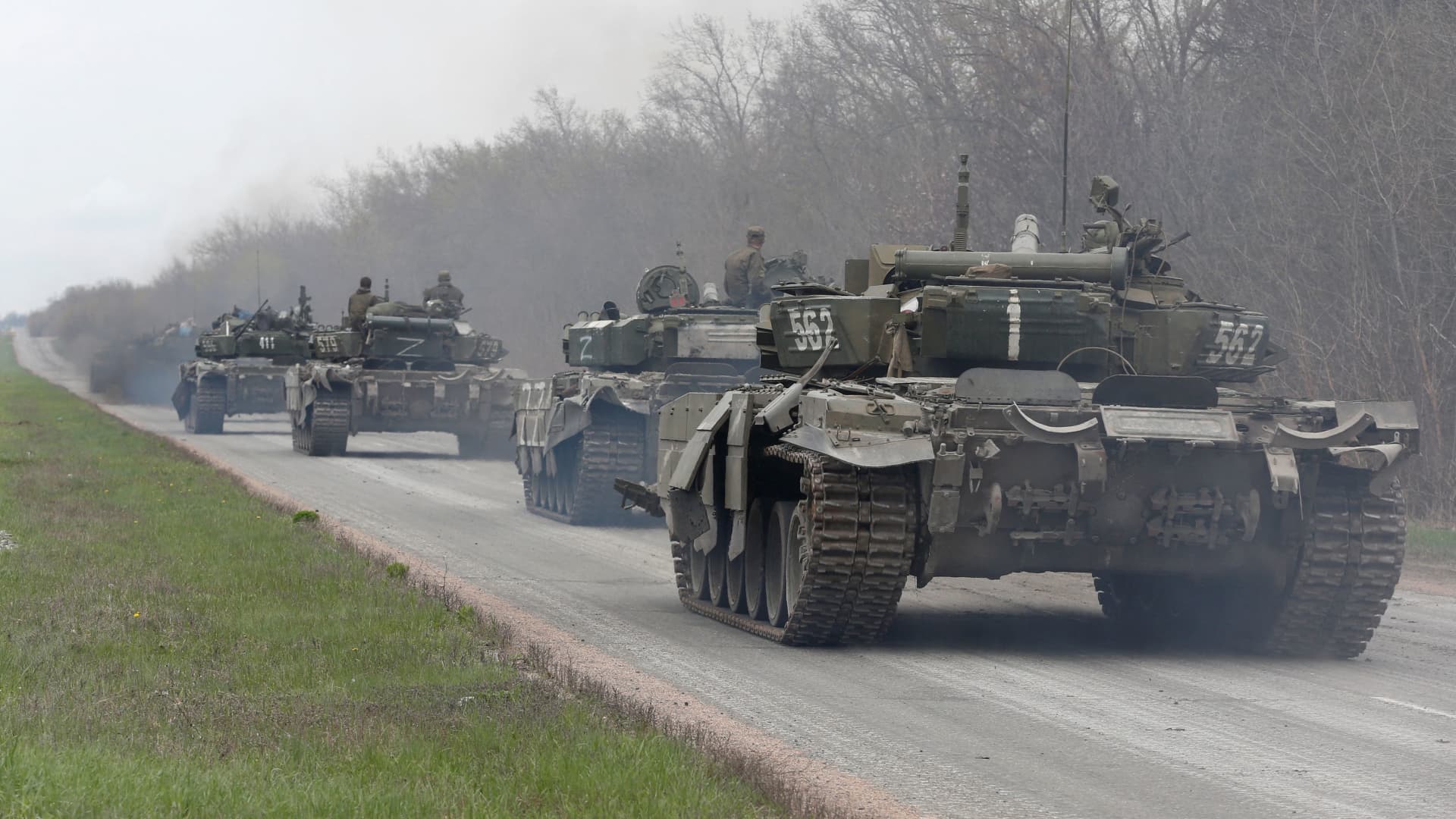
The Ukrainian military says Russia's long-expected offensive push into eastern Ukraine has started, with intensified assaults Monday in the Slobozhansky and Donetsk operational districts in the north and east of the country.
Increased attacks were also recorded near the cities of Izyum in the Kharkiv district and Sloviansk in the Donetsk district, as well as around Severodonetsk and Popasna in the Luhansk region, farthest east.
Earlier on Monday, a senior U.S. Defense official told reporters on a conference call that 11 additional Russian battalion tactical groups moved into Ukraine over the weekend, bringing the total number of BTGs up to 76. The official added that the majority of Russia's ground forces have repositioned in eastern and southern Ukraine.
Russia is expected to deploy the additional troops in part to support the fighting of the main forces and to protect administrative buildings and infrastructure in Kremlin-occupied territories, said Oleksandr Shtupun, a spokesman for the General Staff of the Ukrainian armed forces.
The attacks mark the start of what many analysts and combatants on both sides believe will be the most brutal chapter in Russia's nearly two-month campaign to seize control of Ukraine and its 44 million citizens.
That effort that has so far failed, and the shift underway to concentrate firepower in areas of Ukraine that are already under Russian control is widely viewed as a way for Russian President Vladimir Putin to extract a smaller victory from the Kremlin's large-scale defeat.
— Christina Wilkie


